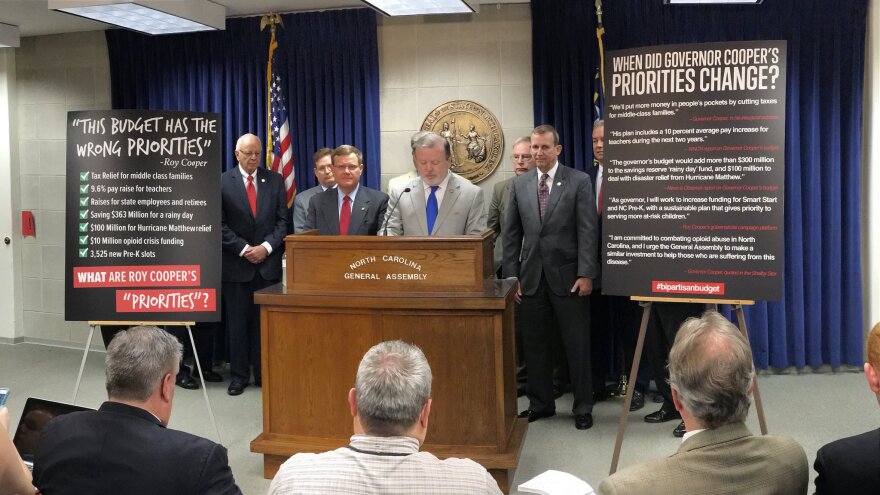A state budget standoff is now in its fifth month. While legislators returned to Raleigh Wednesday following a brief hiatus, a resolution to the fiscal fight is not on their agenda.
Republicans anticipated a long-term budget stalemate like this one a few years ago when they passed an automatic continuing resolution. Now in the absence of a new budget, that law is keeping money flowing at the previously approved spending levels.
That's prevented a government shutdown, although it has not eased negotiations.
When budget talks with Democratic Gov. Roy Cooper and his legislative allies failed to advance over the summer, Republican legislators tried a novel approach: passing one small spending measure after another, piecemeal.
"It doesn't do what North Carolina historically has done," Meredith College Political Science Professor David McLennan said of the piecemeal budgeting.
Negotiation between the two parties controlling the executive and legislative branches of state government, he said, would be more typical. "So the Question going forward is: is this going to be the new normal for how legislative battles are had over the budget, or is this going to be a one-off?" he said.
Among the first dozen or so mini budgets that lawmakers passed were measures providing raises for correctional officers and funding to address a backlog of untested sexual assault evidence collection kits. Those were non-controversial spending measures, with wide support, that the governor signed into law.
But trying to pass a budget piecemeal is like trying to fill up a big rig's gas tank with a Dixie cup.

Those little measures amounted to only about 4% of the overall budget. Big ticket items like teacher raises and money to close a health coverage gap were set aside.
"We saw a number of mini budgets go through pretty easily. And now we're down to the difficult ones," McLennan said. "Whether we're talking about the federal budget process, or we're talking about what happens at the state level, it's always those controversial budgets – and what's in them, or not in them, that causes the problems."
It Started Out With A Veto
Back in June with the humidity climbing, and a legislative session then approaching its seventh month, Republicans, with the help of a few Democrats, passed a $24 billion budget. Democratic Gov. Roy Cooper promptly vetoed it.
"This budget is an astonishing failure of common sense and common decency," Cooper said, as he announced his veto at the executive mansion.
Chief among the governor's concerns with the budget − at the heart of this impasse − was the lack of provisions for expanding Medicaid. The federal program provides healthcare to people living in poverty and with disabilities. North Carolina is one of 14 states that has still not expanded eligibility for the program under the Affordable Care Act.
"Many are dying, because North Carolina has yet to say an important word: Yes. Yes, we will accept Medicaid expansion," Cooper said.
Gone Is The Supermajority
This is the third consecutive year Cooper has vetoed a budget from the Republican-controlled legislature. The first two vetoes were overridden with relative ease by Republican supermajorities. But then last November voters ended the GOP stranglehold and handed the governor a stronger position at the negotiating table.
Now what began as a summer impasse is lurching into the holidays.
"I'm surprised that the entire budget was held up over one policy issue," Sen. Phil Berger (R-Rockingham) said on the Senate floor late last month. "

The Well Of Compromise Has Been Poisoned
For years, Berger has steadfastly remained opposed to Medicaid expansion – stating that there are too many financial unknowns. But, in recent months he has touted the vetoed spending plan for its teacher and state employee raises, tax reductions, and savings to the state's rainy day funds.
The senate leader and House Speaker Tim Moore were optimistic for a time that they could broker a bipartisan group to override the governor's budget veto.
Then, on Sept. 11, House lawmakers held an abrupt – and controversial – override vote with most Democrats absent from the chamber. Rep. Deb Butler (D-Wilmington) went apoplectic.
"Mr. Speaker, you are making a mockery of this process!" she shouted from the floor as the vote was tallied. "You are deceiving all of North Carolina! Your leadership is an embarrassment to the history of this great state!"
That moment went viral and thus far has poisoned the well for any bipartisan agreement.
The Senate has, so far, not voted on a budget veto override.
Instead, lawmakers have continued to pass more mini budgets, forcing the governor to choose: Sign funding for key priorities into law and lose a little bit of leverage with each signature. Or, veto the piecemeal spending plans and advocate for more.
Last Friday, Cooper vetoed proposed raised for teachers, community college, and university employees, calling them "paltry."
For now, educators are left without a raise, an estimated half a million North Carolinians remain in a health coverage gap, and the most influential elected officials in the state have yet to find meaningful common ground.








